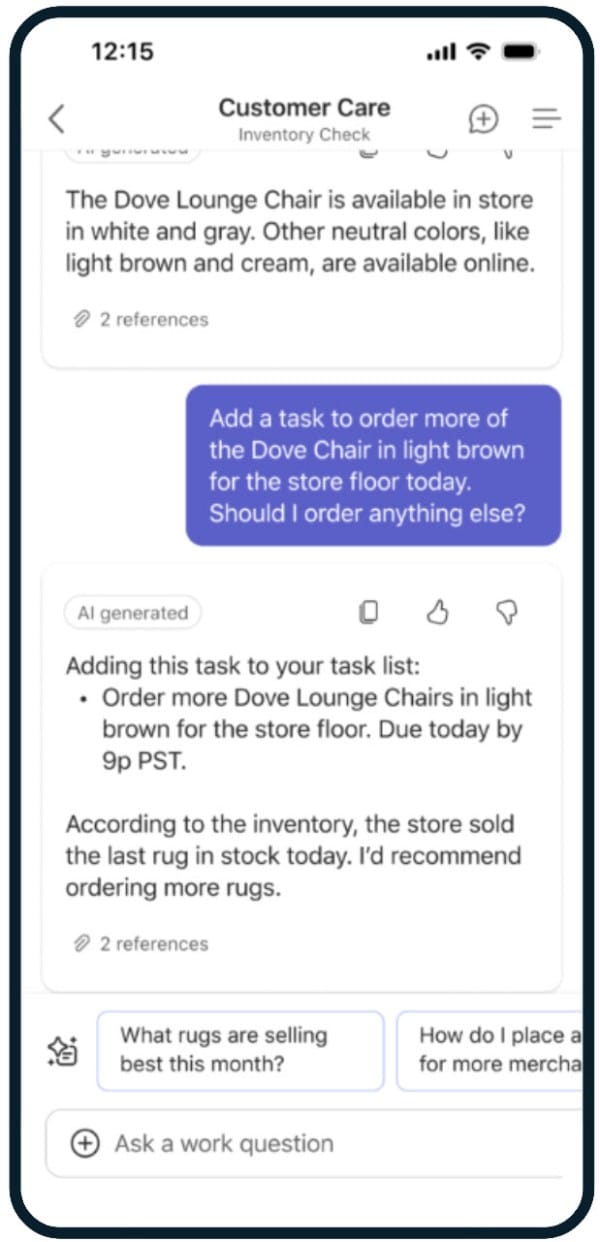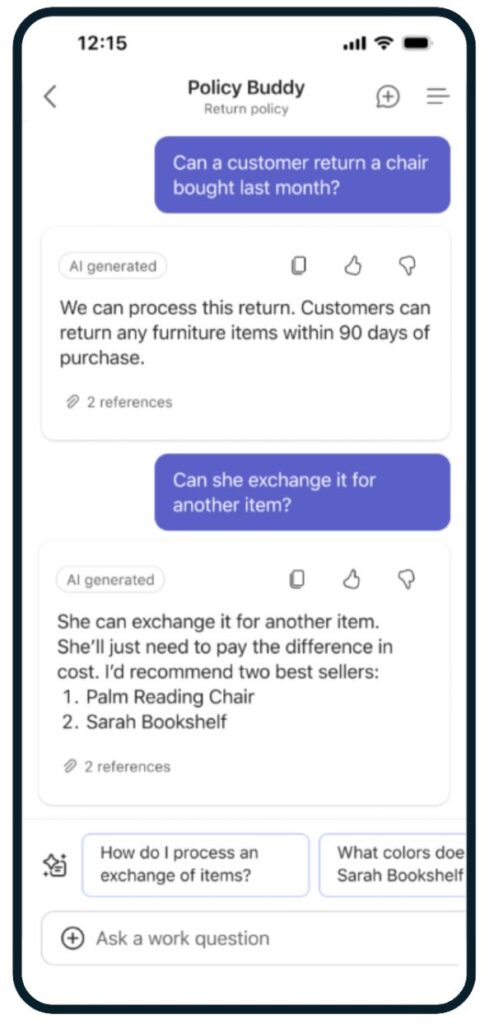Notizie per Categorie
Articoli Recenti
- More human-centered retail with AI 10 Aprile 2025
- Retirement: Canonical Ubuntu 20.04 LTS Reaching End of Standard Support on May 31, 2025 9 Aprile 2025
- Stopping attacks against on-premises Exchange Server and SharePoint Server with AMSI 9 Aprile 2025
- [In preview] Public Preview: Power BI Connector for vCore-based Azure Cosmos DB for MongoDB 9 Aprile 2025
- [In preview] Public Preview: Fabric Mirroring for Azure Database for PostgreSQL – flexible server 9 Aprile 2025
- [Launched] Generally Available: Azure SQL Updates for Early-April 2025 9 Aprile 2025
- [Launched] Generally Available: I/O Performance Analysis—SQL Server on Azure Virtual Machines 9 Aprile 2025
- [In preview] Public Preview: Self-serve enablement for all versions and deletes mode in Azure Cosmos DB for NoSQL 9 Aprile 2025
- How cyberattackers exploit domain controllers using ransomware 9 Aprile 2025
- [In preview] Public Preview: New Enhancements to Carbon Optimization – Expanded API limits, Subscription Reader Access, and Filtering Options 8 Aprile 2025
More human-centered retail with AI
Retail has always been about people and processes coming together to deliver unique and relevant shopping experiences. Now with AI, retailers can enhance engagement, delight customers, and empower employees to solve problems like never before. Imagine the potential for significant gains from AI investments across retail operations—from increased productivity and faster employee onboarding to improved skills development and streamlined store processes. These improvements lead to happier associates and more satisfied customers.
By using more intuitive, natural interfaces to knowledge and information, retailers can start addressing some of retail’s age-old challenges—like finding and retaining the best talent, getting them up to speed quickly, and simplifying store operations so associates can focus on delighting and assisting shoppers.
No matter the size of the retailer, choosing which AI technologies to prioritize and where to start can be challenging. However, there are many ways retailers are now using AI to deliver measurable value and real return on investment (ROI). Research shows that for every $1 a company invests in generative AI, the ROI is 3.7 times across industries and regions (compared to 3.5 times in 2024).1 Top leaders using generative AI are realizing significantly higher returns, with an average ROI of $10.30—nearly three times more.1
To build a foundation for AI success, focus on your business strategy—how AI supports your business goals. Start by identifying the business outcomes you’re aiming for and how AI can help you achieve them.
Here’s a glimpse into how you can start making gains with your AI investments today by focusing on store operations and the frontline.
The frontline is first in line with AI
As the face of retail, frontline workers play a crucial role in the shopper experience. According to recent research by McKinsey, there is a strong relationship between the employee and customer experience, as empowered employees are more likely to deliver superior customer service.2 Yet many frontline workers spend too much time searching for information, and this is one of the top five reported obstacles to their productivity.3
Generative AI offers significant potential for enhancing frontline productivity and wellbeing, with evidence that most frontline workers think it could help, and they would be comfortable using AI for administrative tasks.3 Generative AI can automate routine tasks, allowing associates to engage more with customers. This shift can lead to a more stimulating work environment, which leads to higher job satisfaction and can help retailers combat ongoing challenges with employee turnover, seasonal hiring, and training.
At a more macro level, generative AI can also allow retailers to continuously learn and feed insights back into their business processes and to grow their products, services, and competitive differentiation. Retailers can do that by identifying patterns in recurring employee questions so they can get to the root cause of operational challenges and address key gaps in training and store processes.
Here are some other ways retailers are using generative AI today:
- Swedish retailer Lindex created Lindex Copilot to offer tailored support to store associates and better understand store needs. Generative AI facilitates this bidirectional learning.
- MediaMarktSaturn lets associates to have voice conversations with generative AI, accessing details for every product, service, and warranty while staying engaged with the in-store customer, maximizing conversion and increasing customer satisfaction—all while wearing an earbud.
- Store associates at gourmet chocolatier Venchi use detailed product knowledge and customer insights to address the diverse chocolate preferences of shoppers, achieving a customer satisfaction score of 4.9 out of 5.
While generative AI technologies are still relatively new, these examples offer a glimpse of what’s possible, and help retailers build an AI foundation for more powerful capabilities emerging with agentic AI.
Agents are revolutionizing retail operations
Investing in generative AI is crucial for retailers looking to reinvent customer engagement, empower store leadership and employees, and stay competitive—and now that opportunity has skyrocketed with agents.
Agents use AI to automate and execute business processes, working alongside or on behalf of a person, team, or organization. Now retailers can leverage agents to help their teams work more efficiently and effectively by giving them faster access to information so they can better support customers and be more productive.
Agents vary in levels of complexity and capabilities depending on the need. Agents can help frontline workers with a variety of time-saving tasks—from quickly surfacing real-time product information or details about store policies and procedures to support Q&A or troubleshooting. In addition to helping speed information retrieval, agents can help frontline workers with more advanced features like automated task creation or even advising and summarizing information—such as listing open tasks for a shift handover or flagging missed communications. Agents can also operate independently to dynamically plan, orchestrate other agents, and learn to improve over time. For example, an automated stock transfer agent might scan sales velocity across multiple stores and automatically transfer goods between locations if one store is oversupplied while another is understocked, minimizing manual intervention.
Find in-the-moment answers fast
One important way to get business value from agents is to help store associates find information about company policies or procedures when a customer is waiting for an answer.
SharePoint agents can help store associates find quick answers from internal company sources in seconds. Using the power of natural language, associates simply ask what they’re looking for on their tablet or mobile device and the agent responds in natural language with a link to the policy documentation for reference.
These agents go beyond information retrieval to also generate step-by-step instructions, synthesize product information, and support frontline managers to create and smart-assign shifts, and auto-validate task completion.
Agents can help associates reduce customer wait time, increase information accuracy, and possibly facilitate sales.

Simplify store processes
Complex business processes are another ongoing operational challenge and opportunity for custom agents to help improve productivity.
Custom-built agents can help retailers connect to external data sources and systems so store associates can find information such as product inventory availability in or near their store, shipping status, or how to initiate a return.
Frontline workers simply ask, “Help me initiate a return,” and the agent guides them through the process by clarifying the worker’s intent and providing them with next steps, all through a chat interface.
Custom agents are best suited to also streamline complex workflows like task management, that often involves multiple steps. Using custom agents built with Microsoft Copilot Studio, frontline workers can easily create a task and send it through a task management system that sends automatic alerts as needed, all from a single pane of glass.

Meeting you where you are on your AI journey
Microsoft offers AI solutions that you can customize to meet your unique needs and scale. There are several ways agents can be deployed, from no code to low code and pro code. Here are a couple options available today.
Microsoft 365 Copilot Chat is a new offering that adds pay-as-you-go agents to our existing free chat experience for Microsoft 365 commercial customers. Copilot Chat empowers retailers to get started on their AI journey today and includes querying the public web (such as a retailer’s website) for free. To enhance Copilot Chat, retailers can also build custom agents using Copilot Studio and SharePoint agents that enable access to retail systems such as enterprise resource planning (ERP), customer relationship management (CRM), and product information management (PIM), and to documents on SharePoint. These paid agents are available on a metered basis, so you only pay for what you use.
Store Operations Agent is a pre-built agent available on Copilot Studio enabling retailers to get started fast with a prebuilt solution that acts as an “associate” to your store associate. With this agent, retail employees can:
- Access data from LOB systems: Look up product inventory, check order status, find customer information and compare products.
- Access store policies and procedures: Quickly find answers to questions from knowledge bases such as SharePoint, websites, and across select internet portals.
- Raise incidents for quick resolution: Connect to incident management tools by using more than 1,000 connectors in Power Platform to raise incidents and alert store teams.
Using Store Operations Agent, employees at leading Nordic retailer Kappahl can quickly and securely surface product information, store policies and procedures, and more, increasing store associate productivity and upleveling the shopping experience for customers.
A new era of retail fueled by AI, powered by people
The range of potential gains with AI extends across retail operations—from people to processes to customers, helping make retail more human at every step of the way. From delighting shoppers to helping associates feel more supported and productive, AI can boost store operations efficiency, creating an environment where both shoppers and workers thrive.
Savings achieved using AI can be reinvested to create a better employee experience, fostering a work environment where employees are enthusiastic ambassadors of the brand, bringing the life of the store to customers every day.
Microsoft is the proven leader for AI transformation with the full technology stack and portfolio to help retail and consumer goods organizations power their business with AI. We can help you assess your agent environment, ideate on agent use cases, and establish success criteria for evaluating ROI so you can decide what agent is best for you.
Learn more
Learn more about how these forward-thinking companies are driving ROI with Microsoft 365 Copilot and agents—and illuminating the path ahead for every organization.
- Microsoft’s responsible AI principles
- How CMOs can personalize marketing and optimize spend with AI
- How merchants can drive velocity with AI
- Enhancing supply chain efficiency in the retail and consumer goods industry with agentic systems
- How unifying data improves shopper experiences

2 How retailers can build and retain a strong frontline workforce in 2024.
3 Work Trend Index: Will AI Fix Work?
The post More human-centered retail with AI appeared first on Microsoft Industry Blogs.
Source: Microsoft Industry Blog
